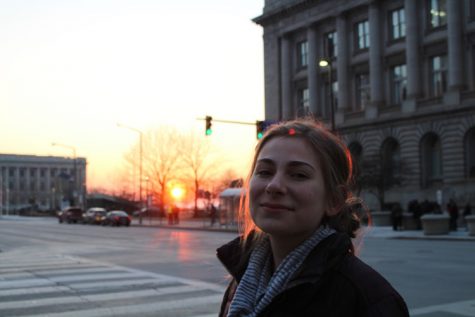Immerse Yourself? …In What?
Oct 17, 2019
Ask people about their immersion experiences, and they will respond with a statement about how much they’ve learned, how it changed their perceptions, revealed their biases or just generally created an atmosphere of learning.
These students, myself included, experience something upon their return that is rarely named — a shift in identity. As I stated before, there are various phrases students use to mention this shift in identity, but they don’t explicitly identify this change in their inner gravity.
The immersion experiences work for social justice by forming the identities of the participants. To demonstrate this transformative process, I will call upon my own experience as a participant of the 2019 Cleveland immersion.
As someone who is not one of the “Campus Ministry people,” and, quite honestly, a general skeptic, I had my doubts about the immersion experience.
I was simply not sold on the idea that one week spent sleeping on the floor and talking to people could inspire me to change my life.
Also, my identity as it was — a person not super-involved in campus ministry and someone who enjoys going against the grain — created preconceived notions about the immersions.
Perceptions are formed through our inherent biases and preexisting beliefs, and they inform us about the facts of the world. Therefore, it is nearly impossible to be objective in our evaluations of anything, making it extremely difficult for our brains to accept something contrary to what we already believe to be true.
This is why I did not recognize my own privilege until a homeless man experienced a seizure in front of me.
The Cleveland group went to the Catholic Worker house. We all divided upon entry: some went to play cards, others chatted over bowls of soup and a group crowded around a teenage rapper playing beats stolen from YouTube.
After a brief moment of these calm interactions, one of the men experiencing homelessness fell to the ground in a seizure.
Immediately, my group was in a panic. We called 911 and moved tables, but some of the regular visitors to the Catholic Worker house did not put down their playing cards. A few even laughed.
Though the man was fine in the end, the situation highlighted that the homeless lack adequate access to healthcare.
Furthermore, it illustrated the disturbing regularity of these incidents — so regular that some did not bother to look up from their mediocre hand in hearts.
It is events like this that have the power to change an identity. This is not to say that every immersion participant will experience something similar, only to say that perceptions are strong, but empathy is stronger.
I left the Catholic Worker house shaking. It did not, as some might say, “set my heart on fire.” Rather, it shook me deeply. I did not feel strong and impassioned. I felt weak, utterly puny and incapable of contributing to any substantive issue.
These are not emotions I am used to feeling. Typically, I am enthusiastic, bright and ready. The immersion did not make me deny these feelings, but it forced me to examine why I was feeling that way, which was an evaluation of myself in relation to the other people around me.
When I performed this same self-evaluation in the Catholic Worker house, in Cosgrove meal center over canned peaches and a gray chicken patty or adjacent to a woman counting her change three times over, the results were vastly different.
It takes throwing yourself into an immersion, or something like it, to truly evaluate your identity in the broader context of the world. Our perceptions are formed by what we know.
Without the immersion, I would never have had the privilege of knowing folks like Turbo, who is the fastest talker I’ve ever met, Joyce, who amused herself endlessly with online turtle videos and Loh, who set up her “office” in a Starbucks every day to escape the winter.
We are all trying to escape the winter — the bitter Cleveland cold that not even a hot shower seems to shake.
It is through accepting this cold, however, that the truth can be made clear, and we can walk together with informed identities and a love of the journey between us.












